More constructive hints?
ECB to Ensure That Lenders Have Enough Liquidity, Visco Says
(Bloomberg) The European Central Bank will continue to guarantee sufficient liquidity for lenders and keep up the fight against market fragmentation among the 17 countries that share the euro, Bank of Italy Governor Ignazio Visco said. “The ECB can’t but continue to pursue these objectives,” Visco said today in a speech in Rome. The ECB cut rates to a record low on July 5 on concern the euro area is slipping deeper into a recession. The central bank, headed by Mario Draghi, agreed in June to help nations in distress by acting as a buying agent for sovereign bonds purchased by government-run bailout funds. The rate cut, to 0.75 percent, is an indication of the ECB’s intention to guarantee “adequate monetary conditions” in the euro area, Visco said. “It followed other measures adopted last month designed to continue to ensure necessary liquidity for the banking system and fight the effects of the fragmentation of monetary and financial markets,” he said.
German Finance Minister Asks Court Not to Block Euro Assistance
(New York Times) The German finance minister warned on Tuesday that there would be severe consequences for the euro currency union if this country’s highest court blocks Germany’s recent ratification of two measures for fighting Europe’s financial crisis.
Officials Spar Over Who Will Guarantee Bank Losses
(WSJ) German finance minister Wolfgang Schäuble said that even once the euro zone’s bailout fund has been authorized to directly recapitalize struggling banks, the lenders’ host government should retain final liability for any losses. “We expect that the final liability of the state will remain” even once the banking supervisor is up and running, he told journalists. He added that what mattered was that the bank support wouldn’t add to a country’s debt—something that he said would be possible even under a scenario where the government retained liability for potential losses. Other officials insisted that banks’ host states wouldn’t have to guarantee any support from the bailout fund.
A Euro-Zone Strategy Shift
(WSJ) Finance ministers from the euro zone agreed that Spain need only reduce its deficit to 4.5% of gross domestic product next year, and 2.8% in 2014, in order to avoid financial penalties. The deal, Spanish Finance Minister Luis de Guindos told reporters, had been clinched without fresh demands on fiscal policy from euro-zone partners, although Eurogroup Chairman Jean-Claude Juncker had warned that there would be a thorough examination of every bank that asks for aid. “I repeat it again, and these are fundamental points, these are two completely independent agreements, they are not related in any way because there is no macroeconomic conditionality in the agreement on the memorandum [of understanding],” he said.
Noyer Warns Hollande of France’s ‘Serious’ Economic Weakness
(Bloomberg) France’s unit cost of labor of 34.20 euros an hour compares with Germany’s 30.10 euros, Italy’s 26.80 euros and 20.60 euros for Spain. Unit labor costs in France have increased by about 20 percent relative to Germany since 2000 as French companies implemented the nation’s 35-hour work-week law, according to Coe-Rexecode. “Of all advanced countries, France has registered, since 2000, the sharpest decline in its market share in global exports,” Bank of France Governor Christian Noyer said. “The drop in the number of hours worked and rigidities in working time arrangements have probably played a role” and reviving exports means tackling all sorts of restrictions that hamper activity, he said.
French current account deficit narrows in May
(AFP) The French current account deficit narrowed slightly in May, owing to a smaller shortfall in the trade of goods and a bigger surplus in services, official data showed on Monday. The Bank of France said the current account, which measures all current payments in and out of the country, showed an overall deficit of 4.1 billion euros ($5.3 billion), compared with a 4.4 billion euro shortfall in April. A breakdown of data showed that the deficit in exchanges of goods had decreased to 5.6 billion euros in May from 6.0 billion in April, while a surplus in services grew to 1.9 billion euros from 1.7 billion.
This is not good if/when implemented:
Rajoy Announces 65 Billion Euros in Budget Cuts to Fight Crisis
(Bloomberg) Spanish Prime Minister Mariano Rajoy announced tax increases and spending cuts totaling 65 billion euros in the next two-and-a-half years. Rajoy’s fourth austerity package in seven months will raise the sales levy to 21 percent from 18 percent; scrap a tax rebate for home buyers; scale back unemployment benefits; consolidate local governments and eliminate the year-end bonus for some public workers. The budget cuts are about double those previously announced. Spain’s central government budget deficit swelled to 3.41 percent of gross domestic product in the first five months of the year, approaching the full-year goal of 3.5 percent after the government brought forward transfers to regional administrations and the social-security system.
Spain Agrees to Guarantee Bond Issuance of Cash-Strapped Regions
(Bloomberg) Spain will guarantee bonds issued by regional governments to help them regain access to capital markets and ease a funding squeeze. The program will be “voluntary” for regions and will come with additional conditions on budget deficits, Antonio Beteta, deputy minister for public administration, told reporters. The plan will be presented at a meeting of regional budget chiefs on July 12, he said. “The mechanism aims to make issues more liquid and easier to place on the markets as they have a central-government guarantee,” Beteta said. Regions face redemptions of about 15 billion euros in the second half of the year, according to data on the Budget Ministry’s website.
Spain Says European Rescue for Banks Opens Door to ECB Funding
(Bloomberg) Spain’s FROB rescue fund will distribute bonds issued by the EFSF to the banks, which “can use them at the ECB if they need the liquidity,” Spanish Economy Minister Luis de Guindos told reporters. As part of the agreement for Spain’s 100 billion-euro bank bailout, one or several vehicles will be created to buy assets from lenders at a “reasonable” price, de Guindos said. Those vehicles will issue bonds that will also be eligible at the ECB. Industrywide conditions for the financial assistance include a 9 percent capital requirement, de Guindos said. A first tranche of 30 billion euros is to be used as soon as the end of the month. Remaining details will be clinched in the memorandum of understanding due to be signed on July 20, he said.


